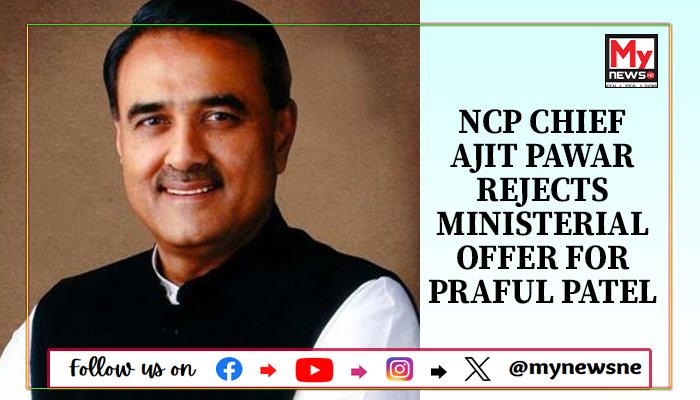NCP Chief Ajit Pawar Rejects Ministerial Offer for Praful Patel, Cites Previous Cabinet Role
National Desk, 10th June: Nationalist Congress Party (NCP) chief Ajit Pawar made a significant announcement ahead of Prime Minister Narendra Modi’s oath ceremony, revealing the party’s decision to decline the Minister of State with independent charge offered to Praful Patel by the BJP. Pawar explained that Patel’s prior service as a Cabinet Minister made it inappropriate for him to accept a lesser role.
“Praful Patel has served as a cabinet minister in the Central government, and hence we did not feel right in accepting the Minister of State with independent charge,” Pawar informed reporters, shedding light on the party’s rationale behind the decision.
During the UPA government tenure under then Prime Minister Manmohan Singh, Patel held the crucial portfolio of Heavy Industries and Public Enterprises.
“We told them (BJP) that we are ready to wait for a few days, but we want a cabinet ministry,” Pawar emphasized, highlighting the NCP’s stance during negotiations with the BJP.
Explaining their parliamentary strength and future prospects, Pawar revealed, “We will have four members in parliament soon, with one Lok Sabha and one Rajya Sabha member at present, and three Rajya Sabha members expected in the next two-three months. So, we expect a cabinet berth.”
While acknowledging BJP’s initial acceptance of their demand, Pawar expressed surprise at the subsequent offer of Minister of State with Independent charge. This offer, he noted, contradicted their understanding of receiving a full cabinet position.
Echoing Pawar’s sentiments, Praful Patel stated, “Accepting the position of Minister of State with independent charge in the Union Cabinet will be considered a demotion for me.” Patel affirmed that they had informed the BJP leadership of their reluctance to accept the offer and were awaiting remedial measures.
The BJP’s reduced tally in Maharashtra, down to nine seats from 23 in the 2019 Lok Sabha polls, appeared to have influenced the negotiation dynamics. The Congress secured 13 seats in the state, significantly up from one, while the NCP clinched one seat. Despite the BJP’s diminished presence, the INDIA bloc posed formidable competition, defying exit poll predictions.
As political alignments and negotiations unfold, the refusal of ministerial offers underscored the nuanced dynamics within the coalition landscape, setting the stage for evolving power equations in the political arena.

